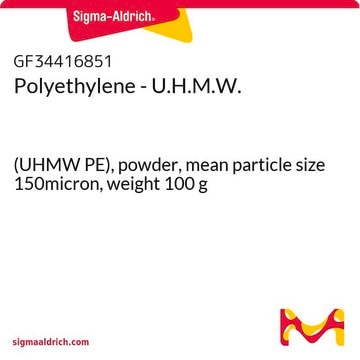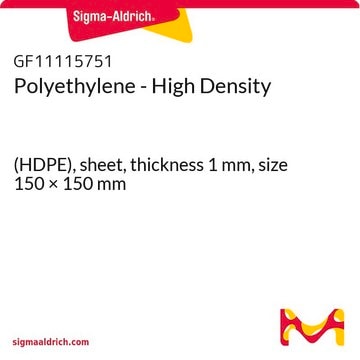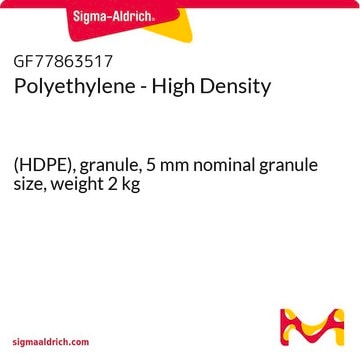547999
Polyethylene
High density, melt index 2.2 g/10 min (190 °C/2.16kg)
Sign Into View Organizational & Contract Pricing
All Photos(2)
About This Item
Linear Formula:
H(CH2CH2)nH
CAS Number:
MDL number:
UNSPSC Code:
12162002
PubChem Substance ID:
NACRES:
NA.25
Recommended Products
form
pellets
melt index
2.2 g/10 min (190 °C/2.16kg)
hardness
65 (Shore D, ASTM D 2240)
transition temp
softening point 123 °C (Vicat, ASTM D 1525)
density
(high density)
InChI
1S/C2H4/c1-2/h1-2H2
InChI key
VGGSQFUCUMXWEO-UHFFFAOYSA-N
Looking for similar products? Visit Product Comparison Guide
Application
Typical applications included specialty injection molded parts.
Features and Benefits
Excellent low temperature impact strength and environmental stress-crack resistance.
Storage Class Code
11 - Combustible Solids
WGK
WGK 3
Flash Point(F)
Not applicable
Flash Point(C)
Not applicable
Personal Protective Equipment
dust mask type N95 (US), Eyeshields, Gloves
Certificates of Analysis (COA)
Search for Certificates of Analysis (COA) by entering the products Lot/Batch Number. Lot and Batch Numbers can be found on a product’s label following the words ‘Lot’ or ‘Batch’.
Already Own This Product?
Find documentation for the products that you have recently purchased in the Document Library.
Customers Also Viewed
Melody Yee-Man Wong et al.
Rapid communications in mass spectrometry : RCM, 27(6), 713-721 (2013-02-19)
Despite various porous materials having been widely adopted as spraying tips for direct sample analysis using electrospray ionization mass spectrometry (ESI-MS), the effect of surface property and porosity of spraying tip materials on their analytical performances is not clear. Investigation
The fouling hydroid Ectopleura larynx: a lack of effect of next generation antifouling technologies.
Nina Bloecher et al.
Biofouling, 29(3), 237-246 (2013-02-27)
The hydroid Ectopleura larynx is one of the main fouling organisms on salmon aquaculture cages in Norway; this study investigated novel surface materials and microtopographies to deter its settlement. The settlement preferences of hydroid larvae for 12 materials with wettabilities
Ryan M Baxter et al.
Journal of biomedical materials research. Part B, Applied biomaterials, 101(3), 467-475 (2013-02-26)
Despite the widespread implementation of highly cross-linked polyethylene (HXLPE) liners to reduce the clinical incidence of osteolysis, it is not known if the improved wear resistance will outweigh the inflammatory potential of HXLPE wear debris generated in vivo. Thus, we
Thibault Honegger et al.
Lab on a chip, 13(8), 1538-1545 (2013-02-23)
In this paper, we introduce a dielectrophoresis (DEP)-based handling method that allows fine 3D manipulation of beads in suspension using a lab on a chip device. The device consists of two layers of linear electrodes on the top and bottom
Morteza Meftah et al.
The Journal of bone and joint surgery. American volume, 95(13), 1193-1197 (2013-07-05)
Ceramic femoral heads produce less wear of the opposing polyethylene than do metal femoral heads in wear simulation studies. This is a matched-pair analysis of the wear of ceramic and metal femoral heads on conventional polyethylene in uncemented total hip
Our team of scientists has experience in all areas of research including Life Science, Material Science, Chemical Synthesis, Chromatography, Analytical and many others.
Contact Technical Service


